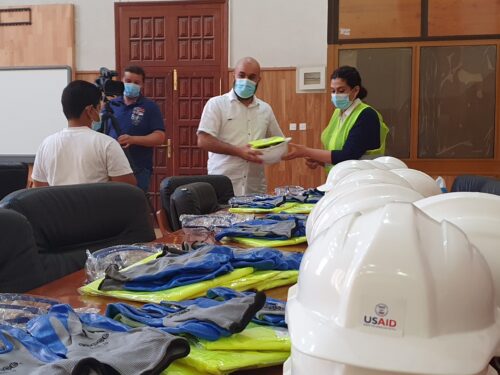COVID-19 and Emergency Operations in Libya

Few countries in the world are as vulnerable to the devastating health, economic and political effects of the COVID-19 pandemic as Libya. With its territory divided between two governments, its national institutions in disarray, its currency rapidly devaluing, and with armed conflict persisting nearly a decade-on from revolution, Libya has few tools that it can use to wage an effective battle against the pandemic.
One exception may lie in the experience, resourcefulness, and commitment to the public good that Libyan municipalities have nurtured since their time as revolutionary city-states in 2011 and 2012. It is this complex stabilizer of today’s Libya – the city – that USAID’s Taqarib project exists to support, and that support has taken-on new urgency in 2020.
Zliten is a modest coastal town on the Mediterranean with some 300,000 residents and an extensive agricultural hinterland. It is situated between the urban centers of Misrata and Tripoli, and in the time since revolution Zliten has competed fiercely with its larger neighbors for the investment of both public and private resources. For Zliten’s forward-looking municipal leadership this competition is simultaneously opportunistic and existential. The sophistication that these competitive urgencies have brought to local governance has established Zliten as a pathbreaker for Libyan cities at large, and an ideal partner for the USAID/Libya Taqarib project.
At the time that the COVID-19 pandemic arrived in Libya, Taqarib was already assisting Zliten with a renewal of its public marketplace, a crucial piece of service-infrastructure for residents, and an important source of revenue for the city.
Then the pandemic struck. A ban on air-travel stranded Zliten’s mayor abroad. Rapidly increasing infection rates forced the city to enact inconsistent curfews, social-distancing requirements, disinfection measures, business shutdowns, and restrictions on inter-city travel. Hospitals scrambled, often unsuccessfully, to obtain lifesaving equipment and supplies. It was a response replete with good intentions, but lacking strategy and order.
In June 2020 USAID dedicated an additional $3.5 million to the Taqarib project, with the focused aim of helping municipalities slow the spread of disease, mitigate economic shocks, and support the legitimacy of local institutions.
In Zliten Taqarib worked immediately with Mustafa Gwili, Director of the city’s Projects Office, to establish an Emergency Operations Center. The project then helped the city to build an array of community emergency response teams; these are multi-disciplinary task-forces with members from the medical professions, business, civil society, local media, code-enforcement, security agencies, even finance and procurement experts, all linked back to city government through the Operations Center.
Taqarib has assisted the Center in publishing and executing an Emergency Operations Plan for COVID-19. The project provides equipment and supplies meant to control the spread of disease through better solid-waste, waste-water, and medical-waste management. Taqarib provides lighted boards for public messaging, kits for emergency power-generation, disinfecting sprayers, and a range of personal protective equipment. Alongside these, Taqarib provides continuous, real-time consultation and training for emergency response teams, using materials that the US Federal Emergency Management Agency and the International City Managers Association have developed for universal application.
Zliten is one of 30 municipalities in Libya that Taqarib will support in much the same way over the next three years. As a successful case-study in rapid, systemic, and goal-oriented transformation to meet the pandemic, Taqarib will support Zliten’s role as a guide, actively assisting its 29 peers. In doing so Taqarib has hope, not only that Libya as a whole will mount a more effective charge against the pandemic, but that in doing so, with cities working together to combat a uniquely threatening and indiscriminate challenge, Libya will also become more whole. In this way we cautiously adhere to the thought that COVID-19 can have a positive legacy in Libya, with some help from Taqarib and USAID.

